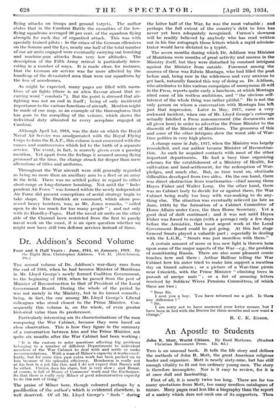Dr. Addison's Second Volume
Tun second volume of Dr. Addison's war-diary runs from the end of 1916, when he had become Minister of Munitions in Mr. Lloyd George's newly formed Coalition Government, to the beginning of 1919, when he passed from the post of Minister of Reconstruction to that of President of the Local Government Board. During the whole of the period he was not merely in the Ministry, but in its inmost councils ; being, in fact, the one among Mr. Lloyd George's Liberal colleagues who stood closest to the Prime Minister. Con- sequently this volume is, on the whole, of even greater historical value than its predecessor.
Particularly interesting are its characterizations of the men composing the War Cabinet, because they were based on close observation. This is how they figure in the summary of a conversation between him and the Prime Minister, not quite six months after the War Cabinet had been working :
" It is the custom to refer questions affecting big problems belonging to a number of different Departments to individual members of the War Cabinet to deal with and settle or make recommendations. With a man of Milner's capacity it worksexcel. lently, but for some time past extra work has been packed on to him because of his splendid efficiency. Henderson is really not at his best in a job like this, and I do not expect that Barnes will be either. Curzon does his share, but is very slow ; and Bonar, of course, is full of House of Commons' work and the Exchequer. So that there is really only Milner of good administrative capacity to do this sort of thing."
The praise of Milner here, though coloured perhaps by a predilection or the author's 'which is evidenced elsewhere, is well deserved. Of all Mr. Lloyd George's " finds " during
the latter half of the War, he was the most valuable ; and perhaps the full extent of the country's debt to him has never yet been adequately recognized. Curzon's slowness will be readily believed by anybody who has read written out in his fine autograph, those letters which a rapid adminis- trator would have dictated to a typist.
The seven months during which Dr. Addison was Minister of Munitions were months of great activity and success in the Ministry itself, but they were disturbed by constant intrigues against the Minister from outside. Foremost among the sources of these was Edwin Montagu, who had filled the post before and, being now in the wilderness and very anxious to get back, naturally fancied this way of doing so. Dr. Addison, who attributes to him various campaigns of anonymous ill-will in the Press, reports quite early a luncheon, at which Montagu aired some of his restless ambitions, and " the obvious self- interest of the whole thing was rather pitiful." He is not the only person on whom a conversation with Montagu has left just that impression. Later in May, 1917, came a very awkward incident, when one of Mr. Lloyd George's entourage actually falsified a Press announcement (the documents are all given here) in order to advertise the Prime Minister to the discredit of the Minister of Munitions. The grossness of this and some of the other intrigues show the worst side of War- time polities in very high places.
A change came in July, 1917, when the Ministry was largely remodelled, and our author became Minister of Reconstruc- tion. As such he acquired contacts with most of the other important departments. He had a busy time organizing schemes for the establishment of a Ministry of Health, for cultivation and land-settlement, for the redemption of War- pledges, and much else. But, as time went on, obstinate difficulties developed from two sides. On the one hand, there was direct obstruction from reactionaries—chief among them Hayes Fisher and Walter Long. On the other hand, there was no Cabinet body to decide for or against them, the War Cabinet being really too busy with war-making to do any- thing else. The situation was eventually relieved (as late as June, 1918) by the formation of a Cabinet Committee of Home Affairs under Cave, the then Home Secretary. Yet a good deal of drift continued ; and it was not until Hayes Fisher was forced to resign (with a peerage) only a few days before the Armistice, that most urgent work at the Local Government Board could be got going. At this last stage General Smuts played a valuable part ; especially in dealing with the L.G.B., " Smuts was just merciless with them."
A certain amount of more or less new light is thrown here upon some of the major aspects of the War—e.g., the problem of munitioning Russia. There are also some pleasant comic touches here and there : Arthur Balfour telling the War Cabinet how his sister tried to make him support a meatless day on tinned salmon ; or a picture of a War-time picnic near Criccieth, with the Prime Minister " climbing trees in pursuit of unripe nuts " ; or a list of amusing letters received by Soldiers' Wives Pensions Committees, of which these are two :
" Dear Sir,
I sent you a boy. You have returned me a . girl. Is there any difference 1"
Sir, I am sorry not to have answered your letter sooner, but I have been in bed with the Doctor for three months and now want a change."
R. C. K. ENSOB.












































 Previous page
Previous page